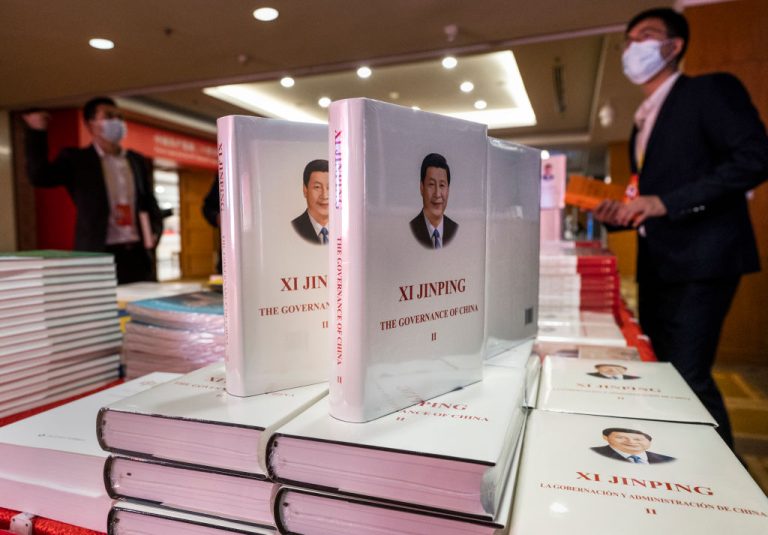On June 25, a high-ranking official of the Beijing city government was expelled for owning political books and journals banned by the Chinese Communist Party (CCP). The incident proves that even those within the highest echelons of the CCP are not safe from Xi Jinping’s repression.
Formerly part of the Beijing branch of the Central Commission for Discipline Inspection — the CCP’s highest internal control institution — the state assets supervisory official Zhang Guilin was thrown out for “serious violations of discipline and law,” and he is subject to “a criminal prosecution,” Radio Free Asia (RFA) reported.
“The investigation found that Zhang Guilin’s political awareness was weak, and he kept and read books and periodicals with serious political issues,” the commission said in a statement, according to state-owned news agency Xinhua.
In addition to possessing forbidden books, Zhang is also accused of having “accepted favors,” and having failed to reveal “sexual transactions.”
Other than Zhang, other officials were also suspected of harboring their own collections of books “with serious political issues.” Xu Shiping, former editor-in-chief of Dongfang.com, was expelled from the CCP for “hiding and reading prohibited books,” along with allegations of “misuse of public funds and abuse of official power.”
Success
You are now signed up for our newsletter
Success
Check your email to complete sign up
Former deputy mayor of Changsha, Chen Zehui, former deputy mayor of Huainan, Li Zhong, and former Chongqing state security police officer Li Bin were also thrown out following similar accusations.
RFA also reported that Taiwanese publisher Li Yanhe, known by his pen-name “Fucha,” was detained on April 20, when he went to China to visit his relatives. Many of Li’s works are banned in China.
READ MORE:
- High-ranking CCP Official in Guangdong, Li Chunsheng, Sacked for Corruption
- Chinese Democracy Activists Exiled in the West to Be ‘Pursued for life’ Says Hong Kong Leader
- CCP Sentences Falun Gong Adherents Who Developed Great Firewall Bypass Software
Book bans
While China’s censorship activities are infamous for sweeping the Internet of online content, the CCP are apparently moving against books and journals, which are said to have snuck their way into the country or be purchased via foreign publishers.
“Books and periodicals with serious political issues” are considered contraband by the CCP, which are said to damage “the image of the party and the country” by shaming their leaders. Under Articles 45 and 46 of the “Regulations on Disciplinary Action in the [CCP],” books and articles that “distort the history of the party and the military” are also banned.
Even books once given the green light by the CCP were made illegal, as was the case for a Uyghur who was sentenced to death for possessing certain textbooks, AP News wrote.
“Even during the extreme era of the Cultural Revolution, they didn’t manage to ban them completely, and it’s even less likely they can do that now,” Deng Yuwen, a former party school professor, who now lives in the U.S., told RFA. “I believe that all of the senior cadres in the party likely have such books.”
Former member of the Qinghai branch of the Chinese People’s Political Consultative Conference, Wang Ruiqin, said that it’s “very common” for banned books to be privately owned, especially among those who reaped the “benefits of the economic reform era [that began in 1979],” Wang said.
Libraries in Hong Kong have also been pulling books related to the Tiananmen Square massacre of June 4, 1989, which they say threatens to damage the city’s image of openness, SCMP wrote.
Xi Jinping’s control of book sales
Meanwhile, Chinese president Xi Jinping has taken control of book sales, with his works forcefully topping sales slots over the past two months. Several of the highest-selling publications in China have been written by Xi himself.
Scholar Jiang Yi stated that the last leader to have dominated book sales rankings was Mao Zedong with his Little Red Book.
“A supreme Chinese leader is once more dominating book sales rankings, and the era of politics by decree has returned,” Jiang said.
Jiang also said that the rankings were due to “a massive system-wide orchestration” where government departments and local enterprises gave mass orders funded by the party or government.
“These books have all been funded by the taxpayer, and have nothing to do with the market economy,” affairs commentator Ji Feng said. “It’s all about propaganda and political correctness, just as it was with Mao Zedong’s anthologies.”














